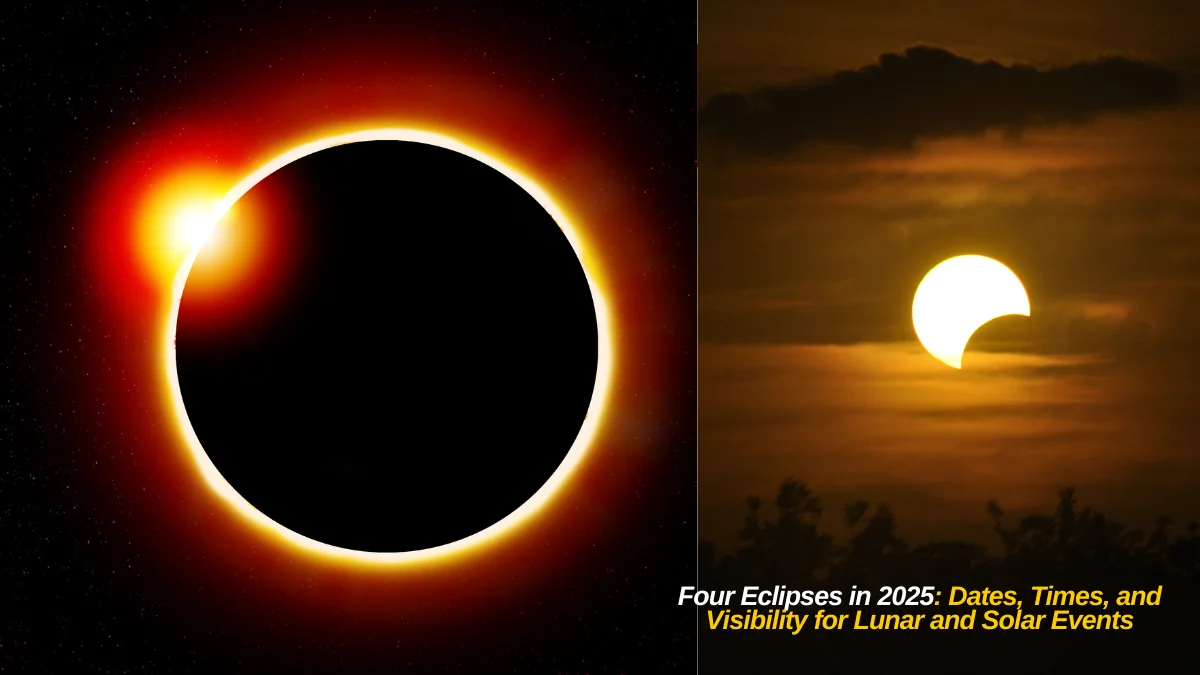The year 2025 will present a series of captivating astronomical events with the occurrence of four eclipses: two lunar and two solar. This cosmic display, as reported by various astronomical sources, will offer stargazers across the globe opportunities for observation, although visibility will vary by location.
Lunar Eclipses of 2025
Two lunar eclipses are scheduled for 2025, one total and one that will be visible in Pakistan.
Total Lunar Eclipse (March 14, 2025)
The first lunar eclipse of the year will be a total lunar eclipse, often referred to as a “Blood Moon” due to the reddish hue the Moon takes on during totality. This event will occur on March 14, 2025.
| Feature | Details |
|---|---|
| Type | Total Lunar Eclipse |
| Date | March 14, 2025 |
| Visibility | Europe, Australia, Africa, the Americas |
| Visibility in Pakistan | Not Visible |
Total Lunar Eclipse (September 7-8, 2025)
The second lunar eclipse, also a total lunar eclipse, will be a highlight for observers in Pakistan. This “Blood Moon” will be visible on the night of September 7-8, 2025.
| Feature | Details |
|---|---|
| Type | Total Lunar Eclipse |
| Date | September 7-8, 2025 |
| Visibility | Pakistan, parts of Asia, Africa, Europe |
| Approximate Timing in Pakistan | Begins 8:28 PM (September 7) and concludes 1:55 AM (September 8) |
Solar Eclipses of 2025
The year will also feature two solar eclipses, both partial.
Partial Solar Eclipse (March 29, 2025)
A partial solar eclipse will occur on March 29, 2025. This event will be observable in certain regions but not in Pakistan.
| Feature | Details |
|---|---|
| Type | Partial Solar Eclipse |
| Date | March 29, 2025 |
| Visibility | Europe, parts of Asia, North and West Africa |
| Visibility in Pakistan | Not Visible |
Partial Solar Eclipse (Late 2025 – Date and Visibility to be Confirmed)
A second partial solar eclipse is expected later in 2025. Precise dates and visibility details, especially for Pakistan, are still pending confirmation from astronomical authorities. This information will be updated as it becomes available.
Understanding Eclipses
Lunar eclipses occur when the Earth passes between the Sun and the Moon, casting its shadow on the lunar surface. This alignment causes the Moon to darken, sometimes taking on a reddish tint during a total eclipse.
Solar eclipses happen when the Moon passes between the Sun and the Earth, blocking the Sun’s light. Depending on the alignment, the eclipse can be total, partial, or annular.
Safe Viewing Practices
It is crucial to emphasize the importance of safe viewing practices for solar eclipses. Looking directly at the Sun, even during an eclipse, can cause severe eye damage. Specialized eye protection, such as certified eclipse glasses or solar viewers, must be used at all times. Regular sunglasses are not sufficient. Lunar eclipses, on the other hand, are safe to view with the naked eye.
2025 Eclipse Summary Table
| Eclipse Type | Date(s) | Visibility (Partial) | Visibility in Pakistan |
|---|---|---|---|
| Total Lunar | March 14, 2025 | Europe, Australia, Africa, the Americas | No |
| Partial Solar | March 29, 2025 | Europe, parts of Asia, North and West Africa | No |
| Total Lunar | September 7-8, 2025 | Pakistan, parts of Asia, Africa, Europe | Yes |
| Partial Solar | Late 2025 (TBC) | Details to be confirmed. | To be confirmed |
The series of eclipses in 2025 provides a valuable opportunity for astronomical observation and public engagement with science. The visibility of a total lunar eclipse in Pakistan makes it a particularly noteworthy year for stargazers in the region. Remember to consult reliable sources for the latest updates on timing and visibility as the dates approach.

